The enormity of Microsoft's Windows Phone shut-down mistake is becoming increasingly clear in the AI era
Microsoft has an Apple-shaped AI nightmare on its hands, as OpenAI realizes the limits of partnering with Microsoft.
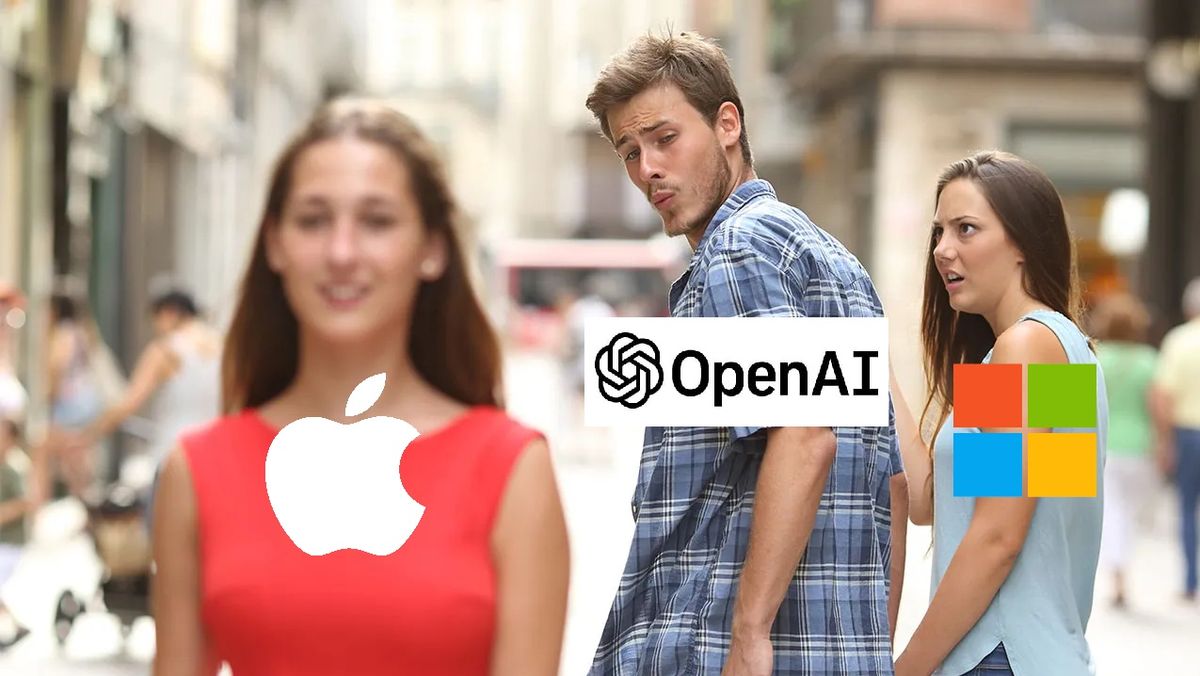
Oh, Microsoft, ye' of little faith.
Hello friends. It's time for your semi-quarterly rant about Windows Phone, brought to you by the CEO of Not Letting Go, Jez Corden himself. But hey, hear me out — we might actually have a compelling case here.
I wrote recently about how Microsoft all too often seems to follow patterns of short-term thinking. Obviously, this isn't always true, given the rise of cloud services and Azure as the income modality du jour for modern Redmond. Don't worry, I'm not going to try to make this whole article rhyme, but grab a cup of tea and indulge me in this latest whine rant.
Microsoft has placed billions of dollars in bets on AI as the future of human-computer interfacing, and nobody can really fault them on this bet. This is a great example of Microsoft most likely getting something right, even if nobody is actually using Microsoft Copilot and similar tools according to recent surveys. But maybe that's simply because most people aren't aware of it yet, or why they might even want to use an AI tool like Copilot or ChatGPT. Either way, I think we can all agree generative AI and large language models (LLMs) are going to have some role to play in daily life, even if it's not necessarily Microsoft's tools that you use.
And indeed, therein lies the problem.
I've written before how I don't think Microsoft will be the one who mainstreams AI tools with consumers, even if their tech ends up powering the back end delivery for some of these tools in the future. However, increasingly, even that is looking unlikely.
An Apple-shaped hole has started to appear in Microsoft's AI strategy, as increasingly, Microsoft has hitched its AI future to partners like OpenAI and NVIDIA, in lieu of home-grown innovation. Microsoft is building its own tools and features, but we've yet to really see anything that isn't at least in part built on OpenAI's technology. And increasingly, OpenAI is flirting with Microsoft's biggest rival to the reported alarm of CEO Satya Nadella.
Get the Windows Central Newsletter
All the latest news, reviews, and guides for Windows and Xbox diehards.
So, what does all of this have to do with Windows Phone? Well, dear reader, let's talk about it.
Microsoft is "worried" about OpenAI partnering with Apple
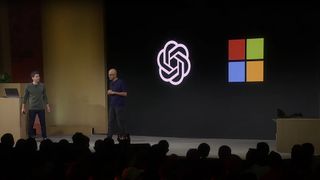
Microsoft CEO Satya Nadella has reportedly expressed "concerns" that OpenAI's new partnership with Apple could somehow impact Microsoft's partnership with OpenAI at some point. The full terms of Microsoft's previous investment deal with OpenAI aren't exactly common knowledge, but it seems that Microsoft has exclusive rights to third-party applications of some of ChatGPT's products, including Dall-E 3 image generation and ChatGPT. Microsoft invested over ten billion dollars into OpenAI for this privilege, while also becoming the default provider of OpenAI's considerably demanding cloud needs.
There has been some odd reports about OpenAI and Microsoft's relationship. OpenAI reportedly derides Microsoft as the "IT department," while Satya Nadella has reportedly said OpenAI "could disappear tomorrow" and it wouldn't matter, since Microsoft has "all the rights to continue the innovation."
It has all the rights indeed, but it doesn't have the right to prevent OpenAI making its own commercialized products based on those same LLMs, and it is doing so at a pace Microsoft is arguably not keeping up with.

While Microsoft demonstrated its Recall feature at Build 2024 a few weeks ago, it has come with a large privacy backlash in its wake. Many regard the feature as "creepy," given that Windows 11 will literally record everything you're doing on your computer. Microsoft insists that it will do so in a secure and private manner, with recordings stored only on your computer, but security researchers and even national regulators seem doubtful. Meanwhile, OpenAI has demonstrated massive advancements in generative video technology, real-time conversational AI, among other things. Personally, all of Microsoft's "innovations" with AI thus far have amounted to fluff, like generative MS Paint doodles and this Recall feature that I suspect many would just turn off rather than use. Microsoft Copilot is also often less powerful and more heavily censored than its OpenAI official counterpart at least in my experience, with Microsoft playing catch up on the latest language models offered via OpenAI. This is only the tip of the iceberg when it comes to Microsoft's OpenAI woes, though.
OpenAI recently announced that its first desktop ChatGPT PC apps would be MacOS exclusive, with a Windows version planned "later," somewhat vaguely. And now, perhaps more importantly, ChatGPT is heading to the iPhone owing to this new partnership with Apple.
This is a big deal, because it effectively locks Microsoft out of mobile in perpetuity, but it didn't have to be this way.
Microsoft needs Windows Phone more than ever
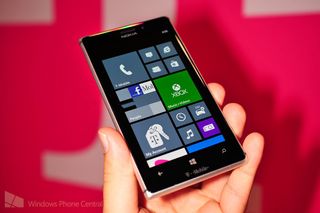
Microsoft CEO Satya Nadella commented a little while ago that one of his biggest regrets was killing off Windows Phone. I bet he regrets it now more than ever.
When it comes to computing paradigms, Microsoft essentially only has two main rivals: Apple and Google, and both have worked pretty hard to wield their respective mobile phone empires to attack Windows itself.
Without a mobile option, Windows is left begging for scraps from the table of Google and Apple, and we all know how that's gone so far. Microsoft's own Android phone platform used Google apps for much of its default services, and Apple straight up locks Microsoft out completely on iOS, blocking Xbox cloud gaming completely. Microsoft has made some small victories asking regulators to force some platforms in some territories to include the option of changing default search engine to Bing or default browser to Edge — but the vast, vast majority simply aren't doing it. Edge and Bing both languish with single-digit market share in their respective areas.
The only, only way Microsoft stood even the vaguest chance of getting its mobile apps and services out there was via a Windows-based mobile device. And Satya's lack of forethought when choosing to kill off Windows Phone is now going to scupper their AI efforts too.
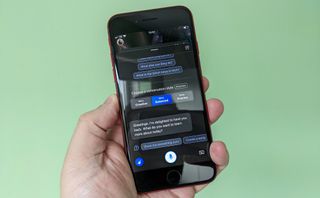
Apple's partnership with OpenAI will see it offer up ChatGPT apps as the default AI toolset for iPad, iPhone, and MacOS. Google will naturally push its own Google Gemini option. Gemini is also being leveraged on the back end by Samsung, the world's largest smartphone manufacturer.
So, where does that leave Microsoft? Microsoft's only endpoints for its own services are Windows, and potentially Xbox. Reliable sources tell us that the next Xbox will sport an NPU for handling some AI tasks, such as automatic Super Resolution, for example, without detracting from the CPU or GPU. The next Xbox will also have some form of Copilot, offering guidance in-game without having to use websites like ours (RIP Windows Central). Still, the amount of people likely to use these tools on Xbox is minuscule compared to the default setting on iOS or Android.
UPDATE: I previously wrote that the NPU attached to the next Xbox will be from Qualcomm, but this was a misunderstanding on my part. Currently, the manufacturer is unknown at my end, but it's most likely AMD. I regret the misunderstanding here, apologies.
At its height, Windows Phone had roughly 30-50 million users based on some estimates. Even though that's only around 3-4% of the global market share of the time, that is at least comparable to Xbox's console user base. But the issue isn't really the amount of users, but more so, the type of users therein.
People use their phones for basically everything. They have replaced desktops and laptops as the primary computing modality, and Microsoft's naïve assumption that Google and Apple would play nice with its services has effectively locked them out of a wide variety of "default" endpoints for a variety of services. This includes search and web browsing as suggested, but also Google and Apple also dictate how gaming works on these devices, and now, crucially, how AI will work on these devices.
With no presence whatsoever in mobile, Microsoft has absolutely no recourse here but to hope and pray people on Apple iOS and Google's Android opt-in to its services. But we all know that's simply not how people work at scale. Between OpenAI's partnership with Apple for its own products, and Google Gemini, Microsoft doesn't have a prayer of capturing the casual audience with its products. If people get locked into ChatGPT or Google Gemini for future AI tasks, they will simply seek out those options on the open ocean that is Windows 11 itself, as we've seen with Chrome and Google today.
Hindsight is 20/20, but it's not too late for Microsoft to make a brave decision
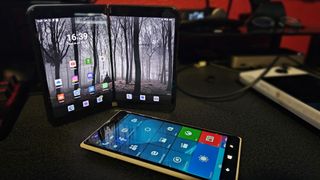
At the end of the day, Microsoft still gets a cut of the action even if OpenAI services become defaulted on iPhone, given that Azure data centers power ChatGPT. But, it wouldn't exactly be difficult for ChatGPT to eventually move away from Microsoft's cloud tech completely, or even build up its own server infrastructure down the line. OpenAI, Apple, and Google are free to define expectations for how AI works for billions of consumers, and I'm just not sure Windows desktop PC versions will be as defining owing to the differences in how consumers use these devices.
Maybe Microsoft is cool just being the backend for the future of computing paradigms. They do get a huge chunk of OpenAI's profit arm after all. But, that's hardly a sure thing either, as NVIDIA rises to prominence as a cloud and AI competitor down the line. Microsoft needs OpenAI more than the other way around, in my view. To that end, I really believe that Microsoft needs its own AI hardware offering here, beyond Windows 11, given how mobile is now the dictating force for consumer computing. Innovation would do more to insulate Microsoft against expiring contracts and shaky partnerships. And sure, most will probably think the ship has firmly sailed for Microsoft to make a dent in phones and telephony, but I disagree.
As AI proliferates, we're already seeing companies experiment with AI-only smart devices, such as the Humane AI Pin and the rabbit r1. And yes, both of these sucked, but it doesn't have to be this way — both of these companies are start ups without the resources that Microsoft has to build the type of AI device that could actually cut through the smartphone monopoly.
Microsoft could partner up with XREAL, an actually good wearable tech company, to explore onboard AI there. Microsoft could make its own AI-first phone, that focuses on reducing distractions and unnecessary screen addiction in favor of productivity. The fact PWAs are powerful enough to deliver like-for-like experiences these days for a vast majority of core apps means that app support wouldn't necessarily be a huge issue, and Microsoft has plenty of its own services to fill in some of the gaps.
Microsoft could be bold and innovative, and give mobility another go. The Surface Duo was too awkward for most people to consider, but why not make a regular Surface Phone that offers something more traditional, albeit with Microsoft's services set up as the default? Google is pushing ahead with its Pixel phones, offering an alternative to Samsung's offering, despite having a smaller market share.
If Microsoft is truly serious about AI and it isn't just another one of Satya's fads like the metaverse was, mobile computing absolutely needs to be a factor. Partnering with a company like Apple or Samsung seems to no longer be an option, so what is left for Microsoft here? Building an Android device or dare I say it, even a Windows on Arm device with telephony has to be worth exploring again. And Microsoft is one of the few companies with the resources to give it a real try. It would have to be a real try though, rather than a half-hearted dabble as we saw with the Surface Duo.
With Surface creator Panos Panay and other hardware heavyweights pushed out of the company, does Microsoft still have the stomach for true home-grown hardware innovation, though? If it wants its AI efforts to not get fully overshadowed by competitors, it may have no choice.

Jez Corden is the Executive Editor at Windows Central, focusing primarily on all things Xbox and gaming. Jez is known for breaking exclusive news and analysis as relates to the Microsoft ecosystem while being powered by tea. Follow on Twitter (X) and Threads, and listen to his XB2 Podcast, all about, you guessed it, Xbox!
-
Mattytwotimes Microsofts days of bold decisions are behind them I think. They'll likely try to ride the enterprise wave as always. Even when they are bold they lack commitment. Satya can't help but be boringReply -
CosmicTourist I don't think Microsoft has ever truly realized that the name of the game is "who controls the future." Unless Microsoft can be first to market with the most innovative technology, both in hardware and software, they are doomed to be following the lead of their rivals, who will set the agenda for the future and who will force Microsoft to make products that meet the standards established by Apple and Google. If Microsoft cannot set the standards themselves, playing catch-up is not a good corporate strategy.Reply
I have opined before that Microsoft's previous ventures into the phone market were, at best, half-hearted, with virtually no marketing support and abandoned as soon as initial sales did not meet with what must have been unrealistic expectations. I purchased three Windows phones and thought there definitely was a place in the market for Windows Phone devices. Those devices were never going to dominate the market against Apple and Google's Android, but they could have established a viable market share that could, over time, become a major player if supported with the right marketing effort and appropriate upgrades to software and hardware. But Nadella caved and now here we are. I'm not optimistic that Microsoft has the cojones to get back into the phone market, notwithstanding their success with the Surface tablets and laptops. Redmond can create good hardware that people actually want to buy and use. They just need to add phones to that list. -
taynjack I've said this before, but Microsoft can't do phones with Satya at the helm. Too many people were burned with Windows Phone. The relentless bad press around those first efforts. Many blame the iPhone toting Satya for that sabotaged into failure event.Reply
Microsoft would need a John Legere type of CEO or perhaps even Panos Panay to convince the public that they are serious about mobile. It would likely cost them double or triple the 30 billion dollar write down they already took. They would have to get more than Microsoft hardware on-board as Surface is still niche. They would have to convince Samsung, or OnePlus, or Motorola. They can't rely just on HP; a non-phone maker.
They would have to prove that they are really committed this time by producing compelling devices with fast upgrades and bug fixes. Stellar support and proof that they are listening to their customers and care about the user experience. Microsoft had a compelling product that was dogged by unfixed bugs and unfinished software, from a software company!
Finally, this will take years. Maybe even a decade to convince people that Microsoft is really committed to mobile again. They will need home run after home run to overcome the huge pile of mistakes that was Windows phone. Surface Duo is proof that Satya isn't even remotely the guy to lead that kind of effort. -
Nerdy Woman After 6+ years with an Android phone, I'd still go out tomorrow and buy a Windows Phone if I could. But the AI-first future is alarming. I just read an article about the resources consumed - water, electricity, minerals like lithium and cobalt - to create death star-sized data centers. While we're trying to reduce dependence on fossil fuels and big tech boasts about being carbon neutral, they're eating the planet to make devices smarter.Reply
That said, Microsoft shareholders have always driven the decision-making. Shareholders want instant gratification and management at Microsoft has never been willing to invest time and resources in the future.
#1 failure at Microsoft? Certainly myopic, but also driven by profits first. And truly innovative designs and products are never overnight sensations. It takes time for consumers to understand why something is better than what they already have.
BTW, I have 3 Surface Pro 2-in-1s (one for work, one for personal, one for travel that I reset after every trip, especially after visiting mom whose virus problems are family lore). And last year, following a breach at the company where I work, they replaced all hardware. There were 7 users who had Surface Pros that were replaced with laptops. They still want their Surface Pros back. -
TechFreak1 Some of us saw this coming years ago. Windows on ARM With Windows Mobile 10 UX is the way to go. The current UX of Windows 11 powered gaming devices due to Microsoft shortsightedness reminds me of the pocketpc era lol... oh the irony is too much, it's just too much.Reply
I want a Windows on ARM powered mobile device with a Windows Mobile 10 UX with 3D live tiles geared around AI as nothing comes close to moving UX forward beyond the static grid of icons that've been using since well... Windows 3.1 or so... I wouldn't mind a Surface Duo with Windows on ARM to be honest.
Windows on ARM + Windows Mobile 10 UX + Continuum + Co-pilot / AI + mobile wallets with secure element on device for both consumer and merchant payments + on device inking.
If Microsoft released this device, I'd be getting one day one. -
Jcmg62 Totally agree.Reply
I posted similar thoughts on the Reddit surface page a couple of weeks ago ( Copilot is great on mobile, but Microsoft are gonna need some hardware to make it pop)
I'm a Duo 2 user. Back in early / mid May, Microsoft updated their launcher with new copilot features. I'm now using copilot all the time. I'm finding ways to integrate it into my phone usage, and it's great.
But I'm only using copilot because it's appeared as shortcuts all over my launcher.
What happens when my Duo 2 dies?
I guess I could download Microsoft launcher to whatever next phone I get, but will I?
Probably not. I think people tend to stick with the launcher that came pre installed. I'm not even sure that an average user would know that they're are alternatives to the stock launcher.
Bottom line, this isn't flight of fancy stuff. Microsoft need to be present in mobile hardware. They need to take all this windows-on-arm progress, build out a mobile windows platform and stick it on a solid bit of kit.
But most of all, and I cannot emphasise this enough, THEY NEED TO STICK WITH IT.
They need to grind it out, accept that they're coming to the party 15 years after the fact, and just grind and grind and grind until they find an audience.
They have the money and the means. Heck, they still have idiots like me, buying their mobile hardware, seven years after they abandoned WP. The fan base is there. It's small, but it's there. -
Jcmg62 Reply
"Windows on ARM + Windows Mobile 10 UX + Continuum + Co-pilot / AI + mobile wallets with secure element on device for both consumer and merchant payments + on device inking."TechFreak1 said:Some of us saw this coming years ago. Windows on ARM With Windows Mobile 10 UX is the way to go. The current UX of Windows 11 powered gaming devices due to Microsoft shortsightedness reminds me of the pocketpc era lol... oh the irony is too much, it's just too much.
I want a Windows on ARM powered mobile device with a Windows Mobile 10 UX with 3D live tiles geared around AI as nothing comes close to moving UX forward beyond the static grid of icons that've been using since well... Windows 3.1 or so... I wouldn't mind a Surface Duo with Windows on ARM to be honest.
Windows on ARM + Windows Mobile 10 UX + Continuum + Co-pilot / AI + mobile wallets with secure element on device for both consumer and merchant payments + on device inking.
If Microsoft released this device, I'd be getting one day one.
This 👆 all day long ☺️ if Microsoft brought out a device like this, I'd be at the front of the queue. -
ShavedMonkey Not this old chestnut again. Billions of dollars were thrown at Windows Phone and it never budged beyond low single digit market share. I owned many but accept it was a niche product. The market didn't like tiles, simple as that.Reply -
TechFreak1 Reply
You seriously want to be stuck using UX that's been in use for decades that is wholly inefficient?ShavedMonkey said:Not this old chestnut again. Billions of dollars were thrown at Windows Phone and it never budged beyond low single digit market share. I owned many but accept it was a niche product. The market didn't like tiles, simple as that.
As someone who used to write contracts on the go and had over 20+ email accounts pinned on my phone, live tiles were a revelation. The current outlook app cannot handle more than 4 accounts at once as anymore battery life takes a beating and don't get me started on the b.s that is "focused" inbox. Like it or not, the world is mobile driven and efficient relay of information is critical. Why do you think Apple had relented and added "widgets". Beyond this there is no other UX design that moves ease of use and efficiency of information forward beyond live tiles.